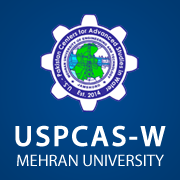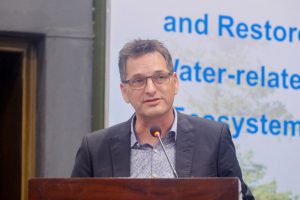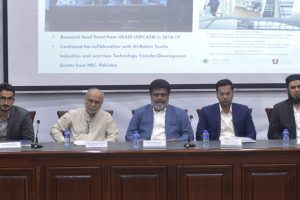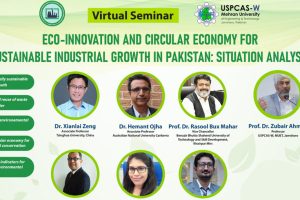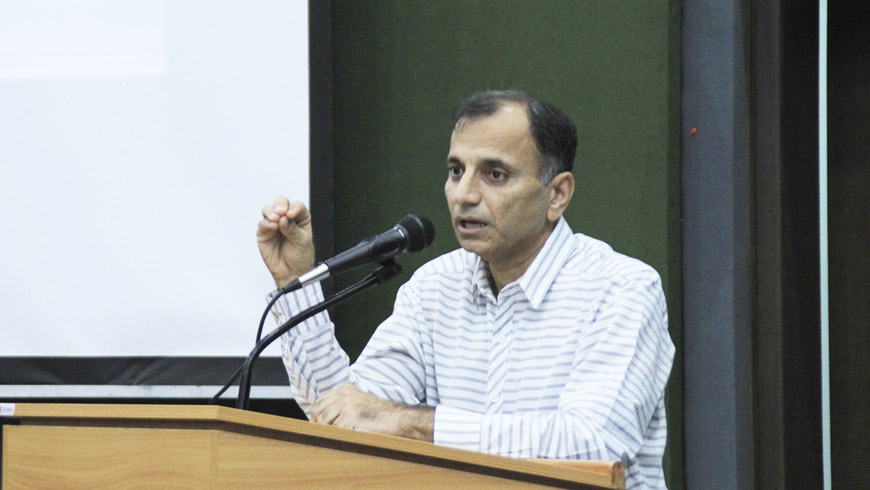
Mr. Ghulam Mustafa Talpur, Oxfam International’s regional head in Aisa on inequality campaaign, delivers lecture on “Redefining water resource management for sustainable and equitable use in Pakistan”
Mr. Ghulam Mustafa Talpur, Oxfam International’s regional head in Asia on inequality campaign, said that fair distribution of resources is a panacea for all ills as faced by Pakistan and the country needs a paradigm shift in water governance. This he said while delivering a lecture on “Redefining water resource management for sustainable and equitable use in Pakistan” in the graduate seminar held in Lecture Theater Hall of U.S.-Pakistan Center for Advanced Studies in Water at Mehran University of Engineering and Technology (MUET) Jamshoro, on Friday. He said that the vision of fair and just society in Pakistan can only be materialized by an equitable distribution of natural resources and providing equal opportunities to access all the basic needs of a life to all and sundry.
He said that virtuous cycle of water-wealth and power exists in Pakistan, a few who usurped the resources of many at the cost of rest of the population who are denied their legal rights including water rights. In Pakistan, he said, a woman plays a very important role in the agrarian society but the country is witnessed as a gender-blind water system. He said that majority of the women in the country engaged in agriculture but on the contrary, they have been denied their water right as they do not possess the land in most of the cases.
He said that the effective land reforms are needed to be introduced granting the land rights to the women. “Water is more valuable than land, because when water is applied to land it increases its productiveness at least six-fold”, Mr. Talpur quoting Sir Charles Trevelyan, a British Civil Servant served in the subcontinent, said that the rich and powerful persons in Pakistan intentionally keep the majority especially the tail-end farmers denied from their due share and right of water as to devalue the price of their land as not only to purchase the same land on cheap rate but irrigate by getting direct outlets illegally. He said these powerful persons, unfortunately, rule the country since its inception and involved in legislation and administration. He said in Sindh the people are denied their access to safe and clean drinking water, in Badin and Thatta, he quoted that people are literally drinking the drainage water, which exposes them to fatal water-borne disease. Mr. Talpur observed that unfair distribution of wealth generated by water resources cause 62% child stunting in rural areas of Sindh.
Mr. Talpur emphasized on the new vision which is woven into the social purpose and redefining the role of relevant institutions with the different set of knowledge and skills and reinventing- challenges bring opportunities. He also shared a number of questions to ponder about for research including the social purpose of irrigation network, correlation of rural poverty and malnourishment with water management, the rural distress linked to unequal water distribution causing any behavioral changes in young population especially leading them to be more fundamentalist, role of a woman in water and climate change challenges. The faculty, management, and students of MUET Water Center, funded by U.S. Agency for International Development (USAID) attended the seminar and participated in the question and answer session followed by the lecture.
A brief profile of the Speaker:
Mr. Mustafa Talpur is currently working as an Asia regional lead of inequality campaign with Oxfam international. He holds a degree in international development from the USA. Mr. Talpur has a keen interest in water resources, especially from the distributional equity perspective. He has extensive work experience in water resources management, governance, and WASH governance in Pakistan and throughout Asia.

